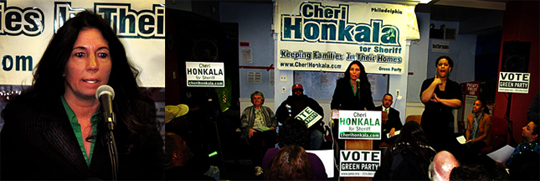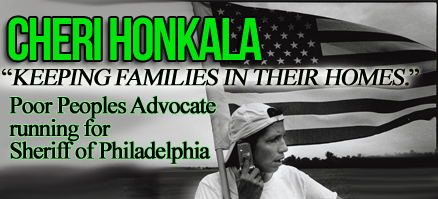A well-known Philadelphia poor peoples advocate has decided to try something different. She’s running for Sheriff of Philadelphia.
Cheri Honkala, founder of the local Kensington Welfare Rights Union and national director of the Poor Peoples Economic Human Rights Campaign, announced on Thursday, February 17, she will be running in the November election as the Green Party candidate for Sheriff in the City Of Philadelphia.
“I’m running for Sheriff because something needs to be done to address the plague of home evictions being faced by poor and working families in Philadelphia,” Honkala said. The theme of the Honkala campaign is: “Keeping Families In Their Homes.”
Since evictions and Sheriff’s sale auctions of foreclosed properties are a core task undertaken by the Office Of Sheriff, Honkala’s entrée adds a provocative dimension to an already interesting race.
 Cheri Honkala announces she's running for Sheriff of Philadelphia
Cheri Honkala announces she's running for Sheriff of Philadelphia
As “The People’s Sheriff,” Honkala says she will fulfill all the traditional functions of the office that includes transport of inmates to and from city prisons and courthouses, as well as courthouse security. “We will green the transporting of prisoners,” she said, which includes preserving both public safety and the dignity of Philadelphia inmates.
Currently, the Sheriff’s office is facing subpoenas from a US Attorney in a federal grand jury probe addressing things like $53 million missing from the Real Estate Department, the department Honkala has her sights set on. The problems came to light after an audit by City Controller Alan Butkovitz.
When Sheriff John Green, who held the elected office for 22 years, was asked about the absence of records covering his staff’s vacation days, he reportedly said he didn’t need records, since Sheriff’s Office workers worked 24/7. Presumably they were working even if they were at one of the new casinos in the city.
Green retired December 31 and the office is now being run by his chief deputy, Barbara Deeley, who is not running for the job.
The office recently hired Joseph Vignola, a well known Philadelphia politico who, of late, has made a niche for himself troubleshooting for cities such as Pittsburgh in fiscal straits. According to the The Philadelphia Inquirer, he was hired “to help resolve concerns” raised by the Butkowitz’s audit, which sounds a bit like the Harvey Keitel character in Pulp Fiction, an ace “cleaner” who comes in to mop up after a bloody shooting.
Currently, there are four people running for Sheriff in the May Democratic primary. Jewel Williams is an ex-cop and the Democratic Party-endorsed candidate. Running against him is John Kromer, who was the city’s housing chief under former Mayor Ed Rendell; Kromer currently teaches urban housing issues at the University Of Pennsylvania.
Kromer wants to eliminate the Office Of Sheriff. If he wins, he has declared his first task will be to facilitate closing the office down and distributing its tasks to the mayor’s office, the prison system and the courts. Eliminating an elective office requires a vote of the City Council and possibly even a referendum of city voters.
Mayor Michael Nutter, overseeing Philadelphia Judge Pamela Dembe and Acting Sheriff Deeley are reportedly also discussing how to move the eviction and auction process from the Sheriff’s office. At the same time, Deeley and new Deputy Vignola are planning a March 16th Sheriff’s sale auction of foreclosed properties.
Given that corruption in the Real Estate Department of the Office of Sheriff has become such a hot potato, efficiency and how to more effectively fill the city’s tax coffers are being cited as the prime motivations for removing the task from the Sheriff’s office.
Meanwhile the question at the heart of the Honkala For Sheriff campaign is: whose interests do the Office Of Sheriff serve in the city of Philadelphia?
In the past, the Sheriff has served the interests of banks and the financial class in their desire to recover what they deem to be theirs–in this case, homes being lived in by poor and working families who, for one reason or another, cannot keep current on their mortgage payments.
Traditionally, the Sheriff has been the bad guy whom the banks rely on to go out and toss families and their belongings onto the street. Honkala says that will never happen if she is elected Sheriff.
“While my opponents proceed from a politics of scarcity, I believe we live in a city and country that has plenty. It has just been protecting the wrong people,” she said at the press conference announcing her candidacy.
“When I become Sheriff of Philadelphia we will have no more empty homes. We will fill vacant homes; we will take the homes left to rot and make them into decent affordable housing. Houses taken by the sheriff’s department in drug raids will be turned into long-term recovery houses.”
She talked of developing “a community-controlled land bank” so, she said, “we can control what happens in our neighborhoods. And we will crack down on speculators who leave abandoned properties to destroy our neighborhoods.”
She envisions a program where families that fall behind on taxes or mortgage payments due to hardships like unemployment will be encouraged to help out in the neighborhood.
“We will not kick them out of their homes!” she vowed.
Finally, in a swipe at the current Sheriff’s office, she said, “We will have a simple, transparent accounting system for the public to monitor. No more backroom deals.”
Honkala was raised the oldest of five kids in a poor family in Minnesota. She is the mother of two children, one who is the independent Hollywood actor/director Mark Webber, the second one a precocious eight-year-old.
Honkala first became homeless while a teenager pregnant with her first son. Over the years, she struggled with homelessness several times, working her way out of it with low-paying jobs and welfare.
At demonstrations and actions, she has been arrested and jailed a number of times. She has spoken at international poor people’s conferences. She has friends in the music and film industries. She has been put on Philadelphia Magazine’s list of the 100 Most Powerful Philadelphians and was named the 1997 Woman Of The Year by Philadelphia Weekly. Activists in Philadelphia exuberantly recall the massive march she organized in 2000 from City Hall down the length of Broad Street to the Republican National Convention.
As Honkala likes to point out, the poor, working family homeowner did not cause the current economic disaster. They simply needed a place to live. It was the profit-seeking greed of a high-flying, unregulated, out-of-control Wall Street financial class noted for “credit default swaps” and virtual Ponzi schemes that led to the real estate bubble, its bursting and the long-term mess we’re in.
At this point, the financial class that created the mess has been bailed out, since the financial institutions at the center of it were judged “too big to fail.” Intimately involved members of that class were appointed to key positions in both the Bush and the Obama administration to oversee the bail-out of those at the top. It was couched as a national emergency and much of it was done in secret.
No one, however, is working very hard to bail out poor and working family homeowners at the bottom — those “too small’ to matter — who only wanted to be part of the great American Dream and have a home.
The just submitted Obama budget sadly seems to follow this pattern and is receiving justifiable flak for giving short-shrift to the poor while giving breaks to the rich. A recent story on NPR pointed out how abysmally inadequate is the federal government’s Homes Mortgage Affordability Program when compared to the scope of the problem.
In Philadelphia, city government may be entering one its periodic house-cleaning eras. On the day this is being written, the front page of The Philadelphia Inquirer featured a story about the FBI opening a “multipronged corruption investigation into kickbacks and payoffs” in the Police Department and the Department of Licenses and Inspection.
Lincoln Steffens wrote about Philadelphia corruption back in 1900 in The Shame Of The Cities, in which he famously observed it was a big factor, as it was in many cities. What he found notable about Philadelphia was its citizens were content with the corruption.
Whether that is still true, or to what degree it’s true, is always a great topic for discussion in the birthplace of American democracy, the City Of Brotherly Love
Some will see the Honkala campaign as a joke, which it is not. Her message will be honed as the campaign develops and it could resonate with voters in this economically stressed time.
 A Honkala For Sheriff banner
A Honkala For Sheriff banner
There is also current and historic precedent for her position on evictions. Last year, for example, sheriffs in both Chicago and Detroit stopped evicting families from homes until the economic bad weather cleared and the banks worked out all the confusion that has been the legacy of the real estate bubble bursting.
New York State just passed a law providing homeowners facing foreclosure free lawyers. This is because finding lawyers has been a major problem for families facing foreclosures. Some lawyers have reportedly been threatened by banks and other powerful forces if they take such cases.
Back in 1933, one of President Franklin Roosevelt’s first acts as President in the midst of the Great Depression was the Home Owners Loan Act, in which the federal government backed up homeowners and guaranteed their loans to prevent foreclosures and evictions. Unlike the current effort, it was adequately funded and effective.
These kinds of helping services are absent in Philadelphia. The city’s government is plagued with corruption and is becoming more and more desperate for income. In such a climate, for a poor peoples’ activist to run for Sheriff promising to turn the office into a watchdog for the interests of the little guy, if nothing else, should stir things up and be educational.
Winning is clearly a long shot, but Honkala says she’s in the Sheriff’s race to win. Either way, win or lose, she’s taking political activism to a new level.
The Honkala campaign can be followed at www.CheriHonkala.com .
